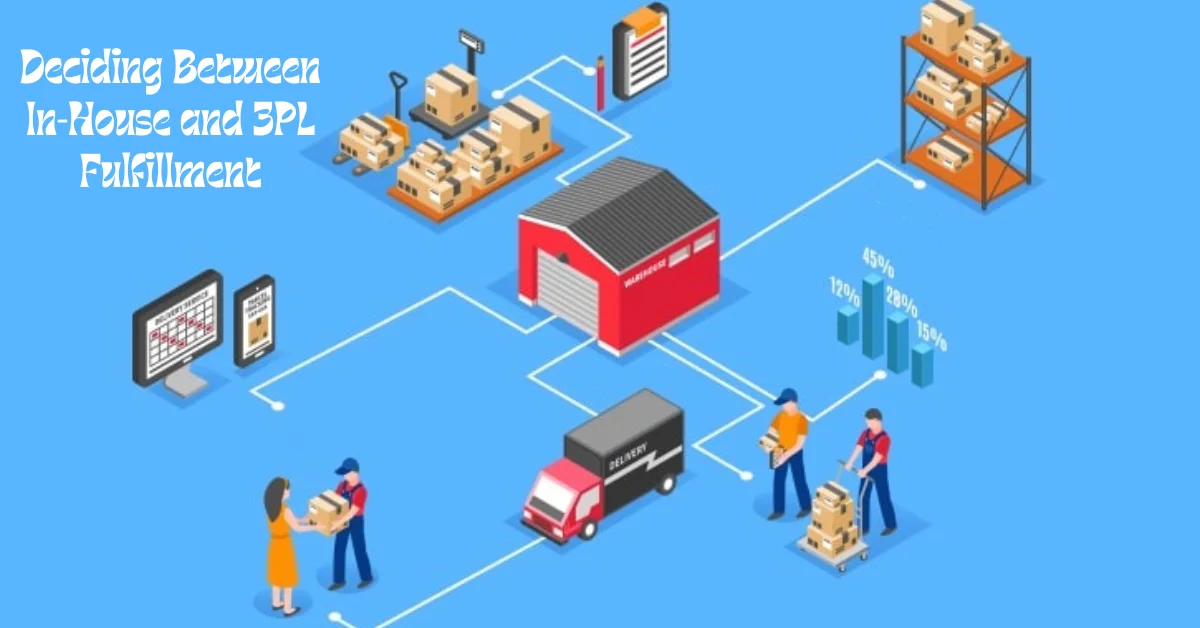In the rapidly evolving business world, one critical decision that can significantly impact your operations is whether to manage logistics in-house or outsource them to Third-Party Logistics (3PL) fulfillment companies. This decision is not just about cutting costs; it’s about aligning your business’s operational capabilities with its long-term strategy. In this blog, we’ll dive into a comprehensive analysis of in-house and 3PL fulfillment methods, helping you make an informed choice for your business’s unique needs.
Table of Contents
Understanding In-House Fulfillment:
In-house fulfillment means your company handles all aspects of logistics, from storing inventory to packing and shipping orders. This option offers direct control over your fulfillment process.
Pros:
- Complete Control: You have direct oversight of inventory management, quality control, and order processing.
- Customization: Offers flexibility to tailor the fulfillment process to specific product or customer needs.
- Direct Customer Interaction: Provides opportunities for personalized packaging and inserts, enhancing customer experience.
Cons:
- Higher Upfront Costs: Requires investment in warehouse space, technology, staff, and inventory management systems.
- Scalability Challenges: Expanding fulfillment operations to match business growth can be resource-intensive.
- Complexity in Management: Managing logistics requires expertise and can distract from core business activities.
Exploring 3PL Fulfillment:
Outsourcing to a 3PL provider means entrusting an external company to handle the logistics. 3PLs specialize in storage, inventory management, and shipping operations.
Pros:
- Cost-Effectiveness: 3PLs can offer economies of scale, reducing per-unit shipping and storage costs.
- Expertise and Experience: 3PLs bring specialized knowledge and technology to optimize logistics.
- Scalability: Easily adapts to business growth, handling increased order volumes without the need for additional investment on your part.
- Risk Management: 3PL fulfillment companies provide expert risk management, mitigating supply chain disruptions and ensuring compliance with regulations, offering a more secure and stable logistics process for your business.
Cons:
- Less Control: You relinquish direct oversight of the fulfillment process.
- Standardization: Limited flexibility in customizing the fulfillment process to specific needs.
- Dependency: Reliance on a third-party provider can be risky if they face operational challenges.
Conducting a Cost-Benefit Analysis:
To determine the best approach for your business, consider the following:
- Evaluate Your Business Size and Volume: Smaller businesses or those with fluctuating order volumes might benefit from the flexibility of 3PL, while larger companies with steady, high-volume sales might manage more cost-effectively in-house.
- Analyze Cost Implications: Compare the fixed costs of in-house fulfillment (warehouse lease, staff salaries, etc.) with the variable expenses of 3PL services.
- Consider Your Growth Trajectory: If your business is scaling rapidly, a 3PL can provide the necessary logistics support without the time and capital investment to expand in-house operations.
- Assess Your Need for Control and Customization: If your business requires high levels of control over inventory or a highly customized fulfillment process, in-house operations might be more suitable.
Why Choose 3PL Bridge for Your Fulfillment Needs
3PL Bridge stands out in the logistics arena with its cutting-edge technology, flexible and scalable solutions, and cost-effective pricing. Our seasoned expertise in the logistics field ensures your products are handled with professionalism and care while our customized services cater to your unique business needs. With a strong emphasis on customer satisfaction and a dedicated support team, partnering with 3PL Bridge means choosing a reliable, efficient, and customer-focused approach to 3PL fulfillment, ensuring your business’s logistics are in expert hands.
Conclusion
Choosing between in-house and 3PL fulfillment is a decision that depends on multiple factors, including your business size, growth rate, cost considerations, and the need for control and customization. By carefully evaluating these aspects, you can make a strategic decision that aligns with your business objectives, ensuring efficient, cost-effective, and customer-centric fulfillment operations.
Remember, the right choice today might not be the best tomorrow. Continuously reassess your logistics strategy as your business evolves to ensure it remains aligned with your changing needs. If you’re considering a 3PL solution, 3PL Bridge is here to help. With our expertise, technology, and customer-focused approach, we can seamlessly integrate with your business, providing tailored logistics solutions that grow with you. Contact us at 3PL Bridge to explore how we can support your fulfillment needs and drive your business forward.











